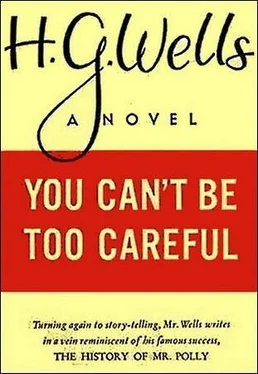H. Wells - You Can't Be Too Careful
Здесь есть возможность читать онлайн «H. Wells - You Can't Be Too Careful» весь текст электронной книги совершенно бесплатно (целиком полную версию без сокращений). В некоторых случаях можно слушать аудио, скачать через торрент в формате fb2 и присутствует краткое содержание. Жанр: Классическая проза, на английском языке. Описание произведения, (предисловие) а так же отзывы посетителей доступны на портале библиотеки ЛибКат.
- Название:You Can't Be Too Careful
- Автор:
- Жанр:
- Год:неизвестен
- ISBN:нет данных
- Рейтинг книги:4 / 5. Голосов: 1
-
Избранное:Добавить в избранное
- Отзывы:
-
Ваша оценка:
- 80
- 1
- 2
- 3
- 4
- 5
You Can't Be Too Careful: краткое содержание, описание и аннотация
Предлагаем к чтению аннотацию, описание, краткое содержание или предисловие (зависит от того, что написал сам автор книги «You Can't Be Too Careful»). Если вы не нашли необходимую информацию о книге — напишите в комментариях, мы постараемся отыскать её.
You Can't Be Too Careful — читать онлайн бесплатно полную книгу (весь текст) целиком
Ниже представлен текст книги, разбитый по страницам. Система сохранения места последней прочитанной страницы, позволяет с удобством читать онлайн бесплатно книгу «You Can't Be Too Careful», без необходимости каждый раз заново искать на чём Вы остановились. Поставьте закладку, и сможете в любой момент перейти на страницу, на которой закончили чтение.
Интервал:
Закладка:
So the struggle against Science is not so much an attempt to uproot and end something tangible and uprootable, as a world-wide disposition on the part of the great vested interests that overshadow our lives and sell us God, government and war to-day, to prevent an undesired and unexpected illumination reaching die general mass of mankind.
In this they have succeeded to a disconcerting extent. You have been told how a sample young Englishman, fifty years after Darwin, could dispose of his relationship to Tarsius and the apes with an oafish guffaw, still believing that he and all things were made, as one might mould clay, by a personal God rather resembling Mr Myame but with a whiter and woollier beard, a little muddled in his identity with an extremely mawkish Saviour who was also his Son, a phosphorescent pigeon intervening. (“Mystery of the Holy Trinity,” comes an echo from Edward Albert. “ ‘Ands off sacred things! ’Oly! ’Oly! ’Oly! People won’t tol’rate you saying things like that, and if God was anything like what he used to be, you’d be struck dead for it instanter”)
Which belated outbreak of Edward Albert’s is exactly why I write with ruthless precision here. The words I have used describe Christian doctrine unconventionally but exactly as it is presented by the Church and Christian art. If my phrases shock the reader, that only shows it is high time.he or she was shocked. The doctrine of the Trinity is, I repeat, atrocious nonsense. Yet all over the English-speaking world, children’s minds are still being paralysed by the injection of this same atrocious nonsense. You can hear the bland voices of the parsons in the British Broadcasting Corporation’s Children’s Hour, telling the old Bible stories as truth, telling of real angels and real miracles, of resurrections and marvels of the utmost absurdity, lying deliberately to earn their livings.
“You talk like the Village Atheist,” protests Bishop Tewler, being as upper-class and socially subtle as he knows how. “All that, we understand quite as well as you do, is just a series of time-honoured stories, dear bewtiful old symbols.” The village atheist was often the salt of the village; and I am proud to rank with him. I had rather jest with him at the public house than dine at the Bishop’s Palace and be lubricated. Have the common people been told that these tales are just symbols? And what do they understand them to symbolise?
When we think of readapting mankind to a world of unity and co-operation, we have to consider that practically all the educational machinery on earth, is still in the hands of God-selling or Marx-selling combines. Everywhere in close co-operation with our nationalist governments, the oil and steel interests, our drug salesmanship and so forth, the hirelings of these huge religious concerns, with more or less [allegiance?] and loyalty, are selling destruction to mankind.
To those italics I will return after a paragraph or so. Plainly if the mind of the world needs urgently to be reconditioned, this is on the face of it a very dismaying state of affairs. And it is not even a practicable suggestion merely to utter the magic word “Science .” Is it really Science we have in mind when we think of a reorganised and mentally reconditioned world? Or are we taking the advancement of Science merely as the sample of the process of sustained free rationalisation, a process capable of a much wider extension to human affairs in general?
Science, as we know it now, gathers prestige as its scope extends, and as the need for experimental teamwork and rapid interchanges increases, it seems to be losing much of its early immunity from interference and perversion. It does not hold power but it creates it now in enormous volume. It has completely revolutionised war, but it has not abolished it. A hundred years ago and scientific research was still mainly a free private activity and science could get along as. that, Now it cannot do so. Now it is open and exposed and continually more vulnerable, and every salesman in the world is trying to attach it and profit by it. But he still finds a difficulty in its essentially protean quality.
The attitude of militant Germany to Science is peculiarly interesting. The bulk of the German people has been disciplined to acquiescence for centuries. That rebellious factor which breaks out in new discoveries and creative inventions has been well nigh drilled out of them. On the other hand, as part of their disposition to subservience, they have a greater respect for scientific achievement than any other people, with the possible exception of the new Russians. They want to capture it and make it their own. So that they will follow up and do more with suggestions and leading ideas that come to them from abroad than almost any other people The theory of National Socialism, and especially its intense racialism, is pseudo-scientific. Homo Tewler var. Germanicus is far less hostile on principle to knowledge and new ideas than are the pluto-Christian democracies.
The group of adventurers, bored by inferiority, who, with such remarkable success, have been selling the world death by unending totalitarian Var, and incidentally having a glorious time, have no use for the religious appeal. They find it a dead appeal. They get better results by producing pseudo-scientific generalisations. Relativity is taboo in Germany, possibly because Hess and Hitler, the joint authors of Man Kampf, were unfitted to understand it, and so were embittered by it, but mainly because its main exponent was a Jew, It was, they declared, not “Nordic.” And in the place of it we were presented with genuine “Nordic” physics. In Hess-Hitler-land Nordic archaeology, Nordic biology and so forth are replacing real archaeology, real biology, etc. In Russia the left priesthood of Communism is attempting a similar strangulation of intellectual life by selling cheap substitutes. Prolet-art, we hear of, and Proletarian chemistry. And a biological worker finds himself driven into exile, to avoid a harsher fate, because “Darwinism” is represented as infringing in some way upon that sacred mystery, the dictatorship of the proletariat.
So far from extending itself into the realms of government and general creative direction, Science as such may be already shrinking back into a subservient position. The continuance of the present scientific process is by no means secure from without or from within. We have seen it assailed and appropriated from without. Within, the specialist, with the mentality of a Greek slave, develops an increasing hostility to the irritating, autocratic-spirited outsider who exasperates him by the broader sweep of his views. He will extinguish him if he can. He will block his interrogative intervention in research organisation. He will take refuge under the wing of authority. The doors of the Royal Society in the days when it was dominated by free-thinking, free-speaking gentlemen have stood open to disturbing ideas, but with the increase in specialisation, there is an increasing disposition for the new sort of scientific worker to appropriate and canalise for hit own satisfaction the prestige accumulated by the old.
Plainly Science as we know it and so far as it is represented by societies, endowments, chairs, honours, titles, museum collections and the like, can be subjugated and replaced by a parody of itself, and it holds out little promise in itself of fresh and vigorous initiatives in the present human riddle. But the question takes on an entirely different complexion if it is realised that, as I have already been hinting, what we call Science, with its bundle of “ologies”, is merely the first harvest of a much wider system of mental motivations which still remains protean, elusive, in the face of systematic opposition, and capable now of rapid destructive processes among our staggering and obsolescent institutions, destruction that will in itself lay bare the broader realities upon which alone world reconstruction can be based. Or to put it in other phrases, there is reason to hope that that same proteus of insubordination which liberated Science, may give us—not a further extension of Science and fresh “ologies”, but something greater, a kindred thing, para-science, the next stage of human liberation, world understanding and world revolution, the dawn of sapiens.
Читать дальшеИнтервал:
Закладка:
Похожие книги на «You Can't Be Too Careful»
Представляем Вашему вниманию похожие книги на «You Can't Be Too Careful» списком для выбора. Мы отобрали схожую по названию и смыслу литературу в надежде предоставить читателям больше вариантов отыскать новые, интересные, ещё непрочитанные произведения.
Обсуждение, отзывы о книге «You Can't Be Too Careful» и просто собственные мнения читателей. Оставьте ваши комментарии, напишите, что Вы думаете о произведении, его смысле или главных героях. Укажите что конкретно понравилось, а что нет, и почему Вы так считаете.












